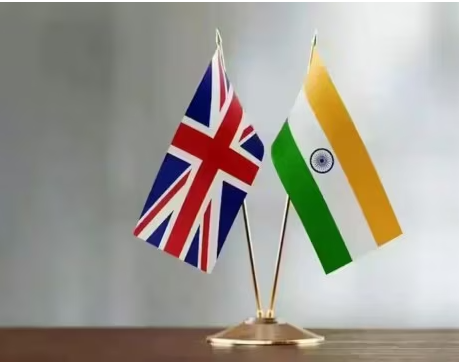The labour party has emerged victorious in the recently concluded elections in the UK. Indian Prime Minister Narendra Modi has moved quickly to establish cordial relations with the new Labour Party Government in UK. Indian Prime Minister has also extended an invitation to the newly elected UK Prime Minister Mr Keir Starmer to visit India. All eyes are now fixated on the future of the India-UK relations.
| Changes expected in the India-UK relations under the Labour Party Govt a. Early conclusion of the India-UK FTA- With the new labour Party govt with a overwhelming majority at the helm of affairs in UK, it is being expected that it will lead to early conclusion of the the ambitious India-UK Free Trade Agreement (FTA). The Labour Party manifesto contained a commitment for the development of a new strategic partnership with India. b. Free and Open Indo-Pacific- Labour plans to work with India to promote a “free and open Indo-Pacific” based on a rules-based order. c. Deepening of Cooperation across all sectors- The labour party has committed to deepening cooperation with India in areas like technology, climate change, and education. d. Push for reforms of Multilateral Institutions- The new labour party govt in the UK will push for multilateralism and reform of multilateral institutions like WTO. e. Deepening of defence and security partnership- The India-UK defence and security partnership is likely to be strengthened, building on recent momentum from the 2+2 mechanism. The labour party has also changed its earlier stance on Kashmir, and now holds Kashmir as an internal Issue between India and Pakistan. |

What has been the history of India-UK relations?
India and the United Kingdom share a long and complex history of relations that spans centuries.
| Colonial Era (1858-1947) | After the rebellion in 1857, India came under direct British rule in 1858. The British monarch became the Empress/Emperor of India. |
| After Independence | India decided to remain in the Commonwealth of Nations after becoming a Republic in 1950 |
| Phase of Strained Relationship | India-UK Relations were strained during the Cold War era. India pursued a non-aligned foreign policy while the UK was a NATO ally of the US. The UK opposed India’s wars with Pakistan and India’s nuclear tests. |
| Phase of Improvement | With the end of the Cold War and economic reforms in the 1990s, UK became more eager to build economic relations with India. This started a phase of improvement in India-UK relations. |
| Phase of Strategic Partnership | The India-UK relationship was upgraded to a Strategic Partnership in 2004. Regular high-level visits and dialogues have strengthened cooperation in areas like trade, investment, defence, and people-to-people links. |
Today, India and the UK enjoy a modern partnership bound by strong historical ties and a shared membership in the Commonwealth. The two countries collaborate extensively across a wide range of areas and are working to establish a comprehensive strategic partnership by 2030.
What are the areas of Cooperation between India-UK?
1. Geo Political Cooperation- UK supports India’s proposal for permanent membership of the UNSC. The UK is also an important interlocutor for India in the EU, G8, G20 and global forums. India-UK political cooperation deepens through institutions and fora such as India-UK Disarmament and Non-Proliferation Dialogue, India-UK JWG on Counter Terrorism and India-UK Foreign Office Consultations.
2. Economic Cooperation- After the establishment of Joint Economic and Trade Committee (JETCO) in 2005, the India-UK economic relations has further deepened.
a. The trade between India and the UK has “more than doubled” between 2007 and 2019. The India-UK bilateral trade has increased to USD 20.36 billion in 2022-23.
b. In 2022, India was the UK’s twelfth largest trading partner, accounting for 2% of the UK’s total trade.
c. India has invested in 120 projects and created over 5,000 jobs in the UK to become their second-largest source of foreign direct investment (FDI) only behind the United States.
3. Defense and Security- India and the UK signed the Defence and International Security Partnership (DISP) in November 2015. It provides a strategic roadmap and direction to the evolving India-UK Defence Relations. At present, some 70 companies in the UK supply goods for aircraft and related equipment besides supporting platforms like the Jaguar, Mirage and Kiran aircraft.
4. Nuclear Cooperation- India and UK have signed a Civil Nuclear Cooperation Declaration in 2010 for the promotion and facilitation of cooperation in the nuclear field. In 2015, a Nuclear Collaboration Agreement was signed between the two countries as part of a comprehensive package of collaboration on energy and climate change.
5. Education- India and UK have been closely collaborating in the field of Education. This is evident in the following cases-
a. The launch of ‘UKEIRI Mobility Programme: Study in India’ in 2019. Under this Britain’s universities collaborate with Indian partners and send UK students to India.
b. UK is among the favoured destinations for Indian students to pursue higher education, with around 50000 Indian students currently studying in UK.
6. Health- India and UK have been closely cooperating in the field of healthcare management. The close collaboration and association are mentioned below-
a. The successful partnership between Oxford University, AstraZeneca and SII on COVID-19 vaccine has demonstrated the potential of Indian and UK expertise working together to solve international healthcare challenges.
b. The two sides are also working on pandemic preparedness, Antimicrobial Resistance (AMR), digital health, Ayurveda and alternative medicines, as well as health worker mobility.
7. Climate and Environment- India-UK Green Growth Equity Fund has been established, which helps in the mobilisation of institutional investments in the renewable energy, waste management, electric mobility and environment sub-sectors in India.
8. Cultural Cooperation- India and UK have signed a Memorandum of Understanding on Cultural Cooperation in 2010. The Nehru Centre (TNC), established in 1992 in London, is the cultural outreach of the High Commission of India in UK.
9. Diaspora Collaboration- Around 1.5 million people of Indian origin live in Britain. Indian diaspora are making significant contributions to the British Society. The representation of people from Indian Origin has increased in the British Parliament. The outgoing PM of UK was also of the Indian Origin.
What is the Significance of the close India-UK relations?
1. Geo-Strategic- Deepening of engagement with UK can help India to counter China’s rise in the Indian Ocean Region. The UK can use India as an alternative destination to China and its companies can invest in India as part of ‘China plus one strategy‘. (China Plus One Strategy- It is the business strategy to avoid investing only in China and diversify business into other countries).
2. Geo-Political- A healthy relationship between the two is imperative for enhancing cooperation in the Indo-Pacific, Afghanistan, UNSC, G20 and Commonwealth. For ex- India welcoming the UK’s accession in the Indo-Pacific Ocean’s Initiative under the Maritime Security pillar.
3. Economic- The India-UK FTA will give a further boost to India’s labour-intensive sectors, increase Indian service exports, and diversify Indian trade partners. The FTA will boost UK’s beverage and automobile industry and UK’s investment in India.
| Read More- India-UK FTA- Explained Pointwise |
4. Climate Change- The deepened India-UK relations will be helpful to achieve the goals of the Paris Agreement and to implement the Glasgow Climate Pact. For ex- India and UK have agreed to work for early operationalisation of the Global Green Grids-One Sun One World One Grid Initiative (OSOWOG) under ISA.
What are the Challenges in the relations?
1. Delay in the conclusion of India-UK FTA- The India-UK FTA which will be win-win situation for both India and UK, has been delayed and has missed several deadlines. The deal has missed the ‘Diwali Deadline‘ which was set last year.
2. Different stands on Russia Ukraine conflict- The U.K has openly criticized the Russian invasion while the same has not yet been done by India. This may emerge as a potential bottleneck in future.
3. UK’s closeness to Pakistan and China- The UK’s ties with Pakistan complicate the process of building a closer defence and security with India. U.K. governments have simultaneously supplied India and Pakistan with weapons or curbed weapons exports.
UK and India have also sometimes diverged in their positions towards China’s role in the Indian Ocean. While India has been concerned with China’s growing influence in the Indo-Pacific region through the Belt and Road Initiative project, the UK by contrast has engaged substantially with Belt and Road.
4. Khalistan Issue- The allegations regarding UK harbouring the issues surrounding Khalistan and Sikh separatism remain as a formidable challenge for deepening of India-UK relations.
5. Slow progress in deepening of Defence Ties- The UK has been slow to adapt to the Indian government’s increasingly preferred method of acquisition- through Government-to-Government (G2G) agreements or Foreign Military Sales (FMS) for deals.
6. Extradition Rigidities- Both the countries have an extradition treaty between them. However, speedy expedition is still a far-fetched dream. India has not been able to extradite Vijay Mallya, Nirav Modi and other fugitives from London.
7. Illegal Migrants- There are more than 1 lakh of illegal Indian immigrants in the UK. The UK government has put pressure to send them back but both the countries have not yet signed the migration and mobility agreement.
8. Anti-colonial resentment against Britain- India still suffers from the legacy of Partition like the problem with Pakistan and the issue of Kashmir.
What Should be the Way Forward?
1. Early materialization of the proposed FTA- The early finalisation of the FTA under the new UK government, will be a stepping stone to a comprehensive agreement that will help revive investments and jobs.
2. Jointly reviving multilateralism and multilateral institutions- India and UK must shed their differences in the stand in the multilateral bodies like WTO and UNFCCC. UK government should stand with the causes of the underdeveloped and developing countries instead of siding with the developed countries.
3. Agreement on “migration and mobility”- India and Britain should explore an agreement on “migration and mobility” to facilitate the legal movement of Indians into Britain.
4. Streamlining the extradition process- UK should live up to its commitment to the extradition of Indian fugitives. For ex- Nirav Modi should be extradited as his extradition process is almost completed.
5. Deeper defence and security engagement- The UK and India’s convergence of interests in the Indian Ocean region offers an important opportunity to increase engagement on defence and security. Hence, both nations should promote standards of transparency and sustainability for infrastructure projects in the Indian Ocean region.
6. Better balancing of relations- The UK should take care for ensuring stronger ties with China and Pakistan are not at the expense of a deeper partnership with India. This will improve India UK relations further.
| Read More- Livemint UPSC Syllabus- GS 2- India’s relation with the developed nations |
Discover more from Free UPSC IAS Preparation Syllabus and Materials For Aspirants
Subscribe to get the latest posts sent to your email.







